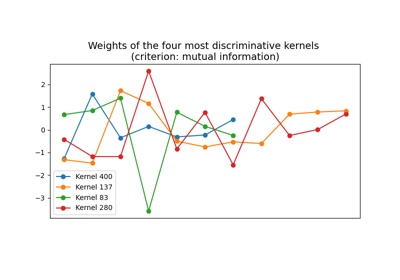pyts.transformation.ROCKET¶
-
class
pyts.transformation.ROCKET(n_kernels=10000, kernel_sizes=(7, 9, 11), random_state=None)[source]¶ RandOm Convolutional KErnel Transformation.
This algorithm randomly generates a great variety of convolutional kernels and extracts two features for each convolution: the maximum and the proportion of positive values.
Parameters: - n_kernels : int (default = 10000)
Number of kernels.
- kernel_sizes : array-like (default = (7, 9, 11))
The possible sizes of the kernels.
- random_state : None, int or RandomState instance (default = None)
The seed of the pseudo random number generator to use when shuffling the data. If int, random_state is the seed used by the random number generator. If RandomState instance, random_state is the random number generator. If None, the random number generator is the RandomState instance used by np.random.
References
[1] A. Dempster, F. Petitjean and G. I. Webb, “ROCKET: Exceptionally fast and accurate time series classification using random convolutional kernels”. https://arxiv.org/abs/1910.13051. Examples
>>> from pyts.transformation import ROCKET >>> X = np.arange(100).reshape(5, 20) >>> rocket = ROCKET(n_kernels=10) >>> rocket.fit_transform(X).shape (5, 20)
Attributes: - weights_ : array, shape = (n_kernels, max(kernel_sizes))
Weights of the kernels. Zero padding values are added.
- length_ : array, shape = (n_kernels,)
Length of each kernel.
- bias_ : array, shape = (n_kernels,)
Bias of each kernel.
- dilation_ : array, shape = (n_kernels,)
Dilation of each kernel.
- padding_ : array, shape = (n_kernels,)
Padding of each kernel.
Methods
__init__([n_kernels, kernel_sizes, random_state])Initialize self. fit(X[, y])Fit the model according to the given training data. fit_transform(X[, y])Fit to data, then transform it. get_params([deep])Get parameters for this estimator. set_params(**params)Set the parameters of this estimator. transform(X)Transform the provided data. -
__init__(n_kernels=10000, kernel_sizes=(7, 9, 11), random_state=None)[source]¶ Initialize self. See help(type(self)) for accurate signature.
-
fit(X, y=None)[source]¶ Fit the model according to the given training data.
Parameters: - X : array-like, shape = (n_samples, n_timestamps)
Training vector.
- y : None or array-like, shape = (n_samples,)
Class labels for each data sample. Ignored.
Returns: - self : object
-
fit_transform(X, y=None, **fit_params)¶ Fit to data, then transform it.
Fits transformer to X and y with optional parameters fit_params and returns a transformed version of X.
Parameters: - X : array-like, shape = (n_samples, n_timestamps)
Univariate time series.
- y : None or array-like, shape = (n_samples,) (default = None)
Target values (None for unsupervised transformations).
- **fit_params : dict
Additional fit parameters.
Returns: - X_new : array
Transformed array.
-
get_params(deep=True)¶ Get parameters for this estimator.
Parameters: - deep : bool, default=True
If True, will return the parameters for this estimator and contained subobjects that are estimators.
Returns: - params : dict
Parameter names mapped to their values.
-
set_params(**params)¶ Set the parameters of this estimator.
The method works on simple estimators as well as on nested objects (such as
Pipeline). The latter have parameters of the form<component>__<parameter>so that it’s possible to update each component of a nested object.Parameters: - **params : dict
Estimator parameters.
Returns: - self : estimator instance
Estimator instance.


